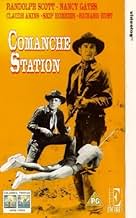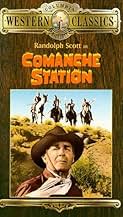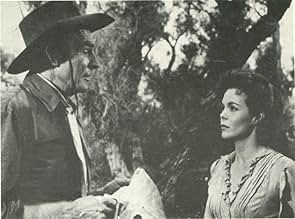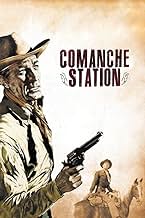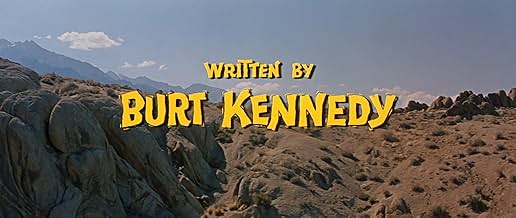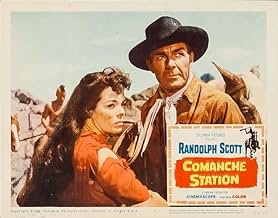VALUTAZIONE IMDb
7,0/10
4785
LA TUA VALUTAZIONE
Aggiungi una trama nella tua linguaA man saves a woman who had been kidnapped by Comanches, then struggles to get both of them home alive.A man saves a woman who had been kidnapped by Comanches, then struggles to get both of them home alive.A man saves a woman who had been kidnapped by Comanches, then struggles to get both of them home alive.
- Regia
- Sceneggiatura
- Star
P. Holland
- Lowe Boy
- (non citato nei titoli originali)
Foster Hood
- Comanche Lance Bearer
- (non citato nei titoli originali)
Joe Molina
- Comanche Chief
- (non citato nei titoli originali)
Vincent St. Cyr
- Warrior
- (non citato nei titoli originali)
Recensioni in evidenza
Comanche Station is produced and directed by Budd Boetticher and stars Randolph Scott, Claude Akins, Nancy Gates, Skip Homeier & Richard Rust. It's written by Burt Kennedy with music and cinematography from Mischa Bakaleinikoff & Charles Lawton Jr. respectively.
Jefferson Cody has for many years been looking for his wife who was kidnapped by Indians. Taking time out from his futile search, he trades with the Comanches to get a woman, Nancy Gates, released. During the journey back to reunite Nancy with her husband, they run into an outlaw and his two protégés. Stating that the Comanches are on their trail and speaking about a reward being offered for Nancy, relations start to disintegrate by the hour.
This was to be the last of seven collaborations between director Budd Boetticher and Western legend Randolph Scott, and it's a most fitting sign off from the duo. Between them they managed to make Westerns with an almost haunting cloud hanging over them, themes of loneliness, complex characters and scenarios segue throughout their output. Here in this fine picture we find Scott's Cody in a complete state of loneliness, but outside of the pain the character clearly carries with him, Cody is a classic Western hero, courage and integrity are fortitude's by which he lives his life.
As this tale unfolds it's evident that Boetticher isn't prepared to offer up conventional Western standards, this, like many of Boetticher's other Westerns, is not a standard Oater, a good versus evil fable, it's a cunningly intelligent picture that's both sad in texture, and also in heart. The film is boosted by Charles Lawton Jr's camera work as he captures some stunning outdoor scenery, the rugged rocks and dusky land creates some striking compositions around the troubled characters.
See this if you are one of those people who thinks Westerns were merely an excuse for Cowboys and Indians high jinx. Boetticher and Scott, leading lights in the sub genre that featured the Ranown Westerns. 8/10
Jefferson Cody has for many years been looking for his wife who was kidnapped by Indians. Taking time out from his futile search, he trades with the Comanches to get a woman, Nancy Gates, released. During the journey back to reunite Nancy with her husband, they run into an outlaw and his two protégés. Stating that the Comanches are on their trail and speaking about a reward being offered for Nancy, relations start to disintegrate by the hour.
This was to be the last of seven collaborations between director Budd Boetticher and Western legend Randolph Scott, and it's a most fitting sign off from the duo. Between them they managed to make Westerns with an almost haunting cloud hanging over them, themes of loneliness, complex characters and scenarios segue throughout their output. Here in this fine picture we find Scott's Cody in a complete state of loneliness, but outside of the pain the character clearly carries with him, Cody is a classic Western hero, courage and integrity are fortitude's by which he lives his life.
As this tale unfolds it's evident that Boetticher isn't prepared to offer up conventional Western standards, this, like many of Boetticher's other Westerns, is not a standard Oater, a good versus evil fable, it's a cunningly intelligent picture that's both sad in texture, and also in heart. The film is boosted by Charles Lawton Jr's camera work as he captures some stunning outdoor scenery, the rugged rocks and dusky land creates some striking compositions around the troubled characters.
See this if you are one of those people who thinks Westerns were merely an excuse for Cowboys and Indians high jinx. Boetticher and Scott, leading lights in the sub genre that featured the Ranown Westerns. 8/10
While the western genre is not my favourite one of all film genres (not sure which one is my favourite due to trying to appreciate them all the same), there is a lot of appreciation for it by me. There are a lot of very good to great films, with the best work of John Ford being notable examples.
'Comanche Station' is the final collaboration of the seven films director Budd Boetticher and lead actor Randolph Scott did together in the late 50s. By all means 'Comanche Station' is not their best pairing (perhaps towards the lesser end, which is not a knock as this merely means it's only because the best of them are so great), but one can totally see the appeal of their collaborations and both Boetticher and Scott are well served, the film being a good representation of both. It is a very good note to go out on and of their films it is perhaps the most overlooked. Which is a shame because it's a very good film with many excellent elements.
By all means not perfect. Nancy Gates is rather bland in a role that is rather underwritten. The film loses momentum on occasions.
However, Scott is as stoic and charismatic as ever with an appealingly craggy edge, being both likeable and tough. Every bit as good is a truly menacing Claude Akins, relishing his quite meaty villainous character. The two work very effectively together and their final confrontation is one of 'Comanche Station's' high points. Boetticher's direction is efficient and lean.
A big shout has to go to the production values. While there is grandeur and atmosphere to the settings it's the photography that's the star, especially in the unforgettable wordless opening sequence, one of my favourite openings of Boetticher's/Scott's films together. The music is rousing yet never intrusive and the more eventful parts blister.
There is thankfully no fat or ramble to the thought-probing, tight and sharply focused script and the storytelling is brutally bleak and movingly elegiac, mostly nicely paced too. 'Comanche Station' may not have the same depth of characterisation as other Boetticher/Scott outings or character complexity, but the two lead characters are interesting and the character interaction is a major plus point numerous times. Notably with Scott and Akins in their final confrontation, which positively blisters.
On the whole, very good. 8/10 Bethany Cox
'Comanche Station' is the final collaboration of the seven films director Budd Boetticher and lead actor Randolph Scott did together in the late 50s. By all means 'Comanche Station' is not their best pairing (perhaps towards the lesser end, which is not a knock as this merely means it's only because the best of them are so great), but one can totally see the appeal of their collaborations and both Boetticher and Scott are well served, the film being a good representation of both. It is a very good note to go out on and of their films it is perhaps the most overlooked. Which is a shame because it's a very good film with many excellent elements.
By all means not perfect. Nancy Gates is rather bland in a role that is rather underwritten. The film loses momentum on occasions.
However, Scott is as stoic and charismatic as ever with an appealingly craggy edge, being both likeable and tough. Every bit as good is a truly menacing Claude Akins, relishing his quite meaty villainous character. The two work very effectively together and their final confrontation is one of 'Comanche Station's' high points. Boetticher's direction is efficient and lean.
A big shout has to go to the production values. While there is grandeur and atmosphere to the settings it's the photography that's the star, especially in the unforgettable wordless opening sequence, one of my favourite openings of Boetticher's/Scott's films together. The music is rousing yet never intrusive and the more eventful parts blister.
There is thankfully no fat or ramble to the thought-probing, tight and sharply focused script and the storytelling is brutally bleak and movingly elegiac, mostly nicely paced too. 'Comanche Station' may not have the same depth of characterisation as other Boetticher/Scott outings or character complexity, but the two lead characters are interesting and the character interaction is a major plus point numerous times. Notably with Scott and Akins in their final confrontation, which positively blisters.
On the whole, very good. 8/10 Bethany Cox
This is the final film that was directed by Budd Boetticher and starring Randolph Scott. Like their previous collaborations, they both work together to produce Westerns that manage to rise above the mediocre norm. In this film, a fairly typical plot idea is executed very well--with a grace and style that make the film well worth seeing.
Randolph Scott, as usual, plays a nice but tough guy. He's brave enough to come into a Comanche stronghold in order to negotiate for the release of a White woman kidnapped by the tribe. However, trouble is in store when three drifters come upon Scott and the woman. It seems that the leader of this group (Claude Akins) is a real rogue and plans with his men to kill Scott and the woman. It seems that the woman's husband has offered a reward for her--and it can be collected dead or alive! So what did I like about the film? First, as usual, Randolph Scott is amazing. He plays the perfect cowboy hero--tough, slow to speak and anger but also a decent man through and through. Plus, he's much more believable than the bigger than life characters John Wayne usually played. I loved Wayne's films, but he was always too tough and too in command. Scott is much more like a very capable 'everyman' character. Second, as usual, Boetticher deliberately underplays the action--producing a muted but also quite believable film. Third, the film had a really nice ending--quite the twist.
You can't do a lot better than a Scott/Boetticher western. While this isn't their best, it certainly is quite good.
Randolph Scott, as usual, plays a nice but tough guy. He's brave enough to come into a Comanche stronghold in order to negotiate for the release of a White woman kidnapped by the tribe. However, trouble is in store when three drifters come upon Scott and the woman. It seems that the leader of this group (Claude Akins) is a real rogue and plans with his men to kill Scott and the woman. It seems that the woman's husband has offered a reward for her--and it can be collected dead or alive! So what did I like about the film? First, as usual, Randolph Scott is amazing. He plays the perfect cowboy hero--tough, slow to speak and anger but also a decent man through and through. Plus, he's much more believable than the bigger than life characters John Wayne usually played. I loved Wayne's films, but he was always too tough and too in command. Scott is much more like a very capable 'everyman' character. Second, as usual, Boetticher deliberately underplays the action--producing a muted but also quite believable film. Third, the film had a really nice ending--quite the twist.
You can't do a lot better than a Scott/Boetticher western. While this isn't their best, it certainly is quite good.
Nice film regarded in certain Western lover circles as a cult classic. She was not the white woman he'd bought , but she was the white woman he was going go keep. She was worth 5000 dollars alive or dead but she was easier to bring in dead . Here Randolph Scott is the loner Jefferson Cole, an obsessive, stubborn man hunting the last ten years for his wife abducted by the Comanches, who rescues instead another kidnapped woman, she is a pretty heroíne, Nancy Gates: an attractive and no mean actress, only yo find himself up against three reward-hungry outlaws : the leader : Claude Akins , and his hoodlum sidekicks : Skip Homeier , Richard Rust, all of them insist on accompanying them back to the spouse homestead, saying they need additional protection. However, Cody soon realizes that this nasty trio are after the reward money and are scheming an ambush .Then Cole ferries the kidnapped woman back to civilisation throughout dangerous ways chased by the violent Comanches .
Tipically tough Randolph Scott western from his later years in films made by Budd Boetticher with whom he played a lot of Western in the Fifties and early Sixties. Magnificently and splendidly written by Burt Kennedy with roles doomed from the start . It results to be a bleakly pesimist movie that gains warmth from moving pursuits , Indian attacks , a discreetly elegiac tone and gently ironical humour .It deals with a simple, and plain plot , a hero achieves rescue a woman and they fall in with three villains , in the capable hands of a trío of awesome uglies , excellently played by Claude Akins , Skip Homeier and Richard Rust.
A Ranown production by Harry Joe Brown and Randolph Scott, delivered by Columbia Pictures , Budd Boetticher made it in medium budget and being finely starred by a solid cast as well as competent filmmaking . It contains a colorful and brilliant cinematography in Technicolor by Charles Lawton Jr, showing barren, stark outdoors and rocky landscapes. As well as atmospheric and thrilling musical score by Mischa Bakaleinikoff. The motion picture was compellingly directed by Budd Boetticher . His first Western was the low budgeted The Wolf Hunters 1949 produced by Monogram. With Universal International Pictures Budd made The Cimarron Kid , Bronco Buster, Horizons West , Seminole , The Man from Alamo. In 1956 he directed Seven Men From Now , a Batjac production , it began a long collaboration with Scott . Following Tall T in 1957 , produced by Harry Joe Brown and Boetticher , Decision at sundown 1957 , Buchanan Rides Alone 1958 , Ride lonesome 1959 , Westbound 1959. Most of them written by Burt Kennedy and Charles Lang Jr and cameramen William Clothier and Charles Lawton Jr . Finally, Boetticher wrote Two mules for the sister Sara by Don Siegel and his ending Western : Dying proud produced by Audie Murphy. Rating 7/10. Better than Average. Well Worth Watching .
Tipically tough Randolph Scott western from his later years in films made by Budd Boetticher with whom he played a lot of Western in the Fifties and early Sixties. Magnificently and splendidly written by Burt Kennedy with roles doomed from the start . It results to be a bleakly pesimist movie that gains warmth from moving pursuits , Indian attacks , a discreetly elegiac tone and gently ironical humour .It deals with a simple, and plain plot , a hero achieves rescue a woman and they fall in with three villains , in the capable hands of a trío of awesome uglies , excellently played by Claude Akins , Skip Homeier and Richard Rust.
A Ranown production by Harry Joe Brown and Randolph Scott, delivered by Columbia Pictures , Budd Boetticher made it in medium budget and being finely starred by a solid cast as well as competent filmmaking . It contains a colorful and brilliant cinematography in Technicolor by Charles Lawton Jr, showing barren, stark outdoors and rocky landscapes. As well as atmospheric and thrilling musical score by Mischa Bakaleinikoff. The motion picture was compellingly directed by Budd Boetticher . His first Western was the low budgeted The Wolf Hunters 1949 produced by Monogram. With Universal International Pictures Budd made The Cimarron Kid , Bronco Buster, Horizons West , Seminole , The Man from Alamo. In 1956 he directed Seven Men From Now , a Batjac production , it began a long collaboration with Scott . Following Tall T in 1957 , produced by Harry Joe Brown and Boetticher , Decision at sundown 1957 , Buchanan Rides Alone 1958 , Ride lonesome 1959 , Westbound 1959. Most of them written by Burt Kennedy and Charles Lang Jr and cameramen William Clothier and Charles Lawton Jr . Finally, Boetticher wrote Two mules for the sister Sara by Don Siegel and his ending Western : Dying proud produced by Audie Murphy. Rating 7/10. Better than Average. Well Worth Watching .
Saw this film again tonite via the DVD, mainly because it's Scott's penultimate film. Immediately thought of similarity to Scott's The Tall T, later to Ride Lonesome and Seven Men from Now. Difference is I'd give that Elmore Leonard story a few notches on this. Claude Akins is better than just Movin On but doesn't have the menace of Richard Boone or Lee Marvin. Scenery is favored over dialogue. Lots of cutting from scene to scene to indicate time has passed. Skip Hoemeier reprises his role as number 2 gun hand to the villain (Billy Jack to Boone ). Scott is great trading with the Comanche or getting the drop on the bad guys. Lots of good but familiar dialogue- "Seemed like a good idea". He is the archetype noble cowboy true to his values and keeping his dignity, yet always practical. I like this film very much and will watch it again; I'm sure.
Lo sapevi?
- QuizLast of the "Ranown Westerns", produced by Randolph Scott and his partner Harry Joe Brown under the Ranown Pictures banner. Scott decided to retire after this one, but two years later he was talked out of retirement by Sam Peckinpah for Sfida nell'alta Sierra (1962). After that film, Scott retired for good.
- BlooperDuring the final shootout with Claude Akins, Randolph Scott and Nancy Gates run and hide in a small rock cave in the hills. As they look out of the cave, a crew member in a blue shirt stands in the path in front of them. When Randolph Scott leaves the cave, he runs right past this crew member.
- ConnessioniFeatured in The Guardian Interview with Budd Boetticher (1994)
I più visti
Accedi per valutare e creare un elenco di titoli salvati per ottenere consigli personalizzati
- How long is Comanche Station?Powered by Alexa
Dettagli
- Data di uscita
- Paese di origine
- Lingue
- Celebre anche come
- Comanche Station
- Luoghi delle riprese
- Azienda produttrice
- Vedi altri crediti dell’azienda su IMDbPro
- Tempo di esecuzione1 ora 13 minuti
- Proporzioni
- 2.35 : 1
Contribuisci a questa pagina
Suggerisci una modifica o aggiungi i contenuti mancanti


